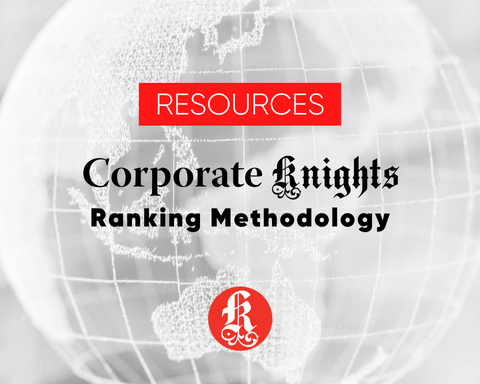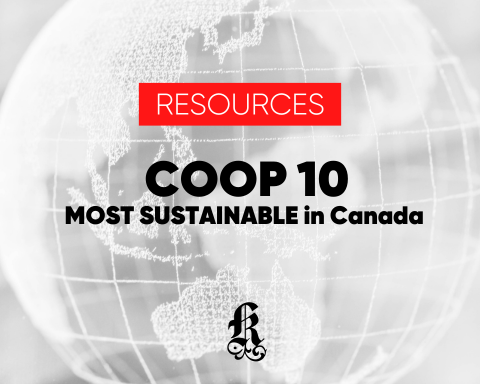Methodology
Eligibility criteria
Equity funds must have at least two-thirds of their holdings by market weight rated in the Corporate Knights Research universe; for balanced/corporate fixed income funds, the minimum threshold is 50% of the holdings by market weight to be rated in the Corporate Knights Research universe.‡
Rating metric
Funds (mutual funds and ETFs) receive a rating based on the weighted sustainability rating* of each of the funds’ underlying holdings (“Weighted Rating”).
Example: XYZ Fund
| Holdings | Weight | Sustainability Rating |
|---|---|---|
| AAA Co Ltd. | 50% | 25% |
| BBB Co Ltd. | 40% | 10% |
| CCC Co Ltd. | 10% | 50% |
| Weighted rating | 21.5% |
Holdings date
Fund ratings are based on most recently available holdings breakdowns as provided by Fundata as of September 30, 2025.
Fund categories
Funds are classified according to the classification system established by the Canadian Investment Funds Standards Committee (CIFSC) at the “Fund Type” level of classification as provided by Fundata.
Fund scoring
Each fund receives a score that is based on the percent rank score of the fund’s Weighted Rating against other funds in the same category (“Final Score”). Scores range from 0% to 100%.
Example: Canadian equity
Fund Name Weighted Rating Final Score
X Equity Growth 50% 100%
Y Canadian Equity 40% 67%
Z Value Fund 10% 33%
Omega Index Fund 5% 0%
Corporate Knights 2025 podium funds: Top 10 funds in category ranking
For fund categories where there are at least 12 RI funds (defined below) and at least 50 funds that meet the minimum eligibility criteria, the top 10 scoring funds in each assessed fund category are allowed to communicate that Corporate Knights has ranked them as being among the top 10 responsible funds in the given category based on this methodology. Four fund categories meet these conditions:
- Canadian equity
- global equity
- international equity
- U.S. equity
RI funds are those funds that:
A. Have an ESG mandate or objective as identified from:
- The CIFSC list of qualifying funds,
- The Responsible Investment Association’s funds, and
- The TMX list of sustainable ETFs
and/or:
B. Are ESG-Related Funds* which are funds where the consideration of ESG factors plays a role in their investment process and confirmed by Corporate Knights Research review of the funds’ disclosures of their investment strategies in their prospectuses and due diligence with the fund manager/s.
* Based on the CSA Staff Notice 81-334 (Revised) ESG-Related Investment Fund Disclosure
Footnotes:
*The sustainability rating is based on Corporate Knights’ rating methodology as deployed in the 2026 Global 100 Most Sustainable Corporations in the World ranking, which can be accessed here.







